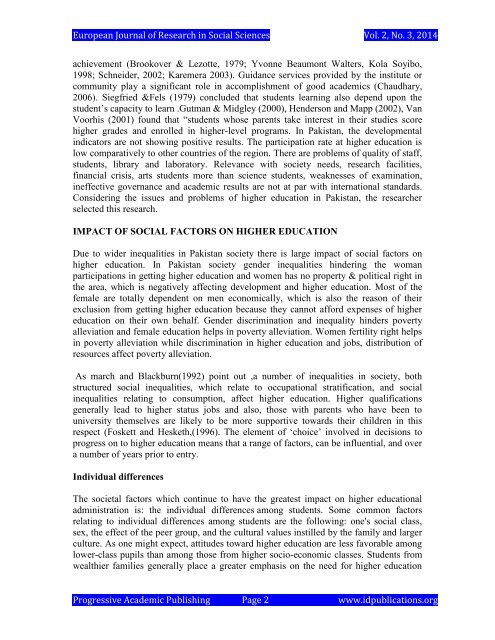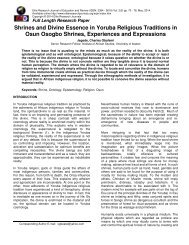Sociology-of-higher-education-a-case-study-of-Pakistan-Full-paper
Sociology-of-higher-education-a-case-study-of-Pakistan-Full-paper
Sociology-of-higher-education-a-case-study-of-Pakistan-Full-paper
Create successful ePaper yourself
Turn your PDF publications into a flip-book with our unique Google optimized e-Paper software.
European Journal <strong>of</strong> Research in Social Sciences Vol. 2, No. 3, 2014<br />
achievement (Brookover & Lezotte, 1979; Yvonne Beaumont Walters, Kola Soyibo,<br />
1998; Schneider, 2002; Karemera 2003). Guidance services provided by the institute or<br />
community play a significant role in accomplishment <strong>of</strong> good academics (Chaudhary,<br />
2006). Siegfried &Fels (1979) concluded that students learning also depend upon the<br />
student‘s capacity to learn .Gutman & Midgley (2000), Henderson and Mapp (2002), Van<br />
Voorhis (2001) found that ―students whose parents take interest in their studies score<br />
<strong>higher</strong> grades and enrolled in <strong>higher</strong>-level programs. In <strong>Pakistan</strong>, the developmental<br />
indicators are not showing positive results. The participation rate at <strong>higher</strong> <strong>education</strong> is<br />
low comparatively to other countries <strong>of</strong> the region. There are problems <strong>of</strong> quality <strong>of</strong> staff,<br />
students, library and laboratory. Relevance with society needs, research facilities,<br />
financial crisis, arts students more than science students, weaknesses <strong>of</strong> examination,<br />
ineffective governance and academic results are not at par with international standards.<br />
Considering the issues and problems <strong>of</strong> <strong>higher</strong> <strong>education</strong> in <strong>Pakistan</strong>, the researcher<br />
selected this research.<br />
IMPACT OF SOCIAL FACTORS ON HIGHER EDUCATION<br />
Due to wider inequalities in <strong>Pakistan</strong> society there is large impact <strong>of</strong> social factors on<br />
<strong>higher</strong> <strong>education</strong>. In <strong>Pakistan</strong> society gender inequalities hindering the woman<br />
participations in getting <strong>higher</strong> <strong>education</strong> and women has no property & political right in<br />
the area, which is negatively affecting development and <strong>higher</strong> <strong>education</strong>. Most <strong>of</strong> the<br />
female are totally dependent on men economically, which is also the reason <strong>of</strong> their<br />
exclusion from getting <strong>higher</strong> <strong>education</strong> because they cannot afford expenses <strong>of</strong> <strong>higher</strong><br />
<strong>education</strong> on their own behalf. Gender discrimination and inequality hinders poverty<br />
alleviation and female <strong>education</strong> helps in poverty alleviation. Women fertility right helps<br />
in poverty alleviation while discrimination in <strong>higher</strong> <strong>education</strong> and jobs, distribution <strong>of</strong><br />
resources affect poverty alleviation.<br />
As march and Blackburn(1992) point out ,a number <strong>of</strong> inequalities in society, both<br />
structured social inequalities, which relate to occupational stratification, and social<br />
inequalities relating to consumption, affect <strong>higher</strong> <strong>education</strong>. Higher qualifications<br />
generally lead to <strong>higher</strong> status jobs and also, those with parents who have been to<br />
university themselves are likely to be more supportive towards their children in this<br />
respect (Foskett and Hesketh,(1996). The element <strong>of</strong> ‗choice‘ involved in decisions to<br />
progress on to <strong>higher</strong> <strong>education</strong> means that a range <strong>of</strong> factors, can be influential, and over<br />
a number <strong>of</strong> years prior to entry.<br />
Individual differences<br />
The societal factors which continue to have the greatest impact on <strong>higher</strong> <strong>education</strong>al<br />
administration is: the individual differences among students. Some common factors<br />
relating to individual differences among students are the following: one's social class,<br />
sex, the effect <strong>of</strong> the peer group, and the cultural values instilled by the family and larger<br />
culture. As one might expect, attitudes toward <strong>higher</strong> <strong>education</strong> are less favorable among<br />
lower-class pupils than among those from <strong>higher</strong> socio-economic classes. Students from<br />
wealthier families generally place a greater emphasis on the need for <strong>higher</strong> <strong>education</strong><br />
Progressive Academic Publishing Page 2 www.idpublications.org






